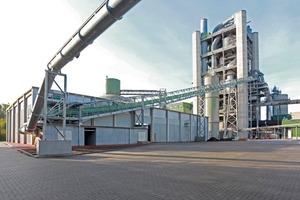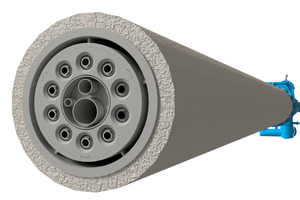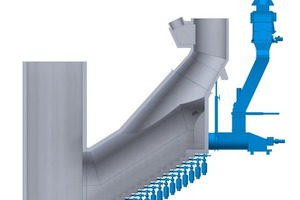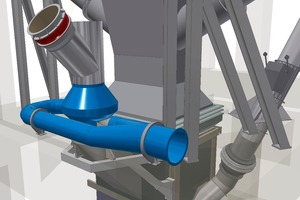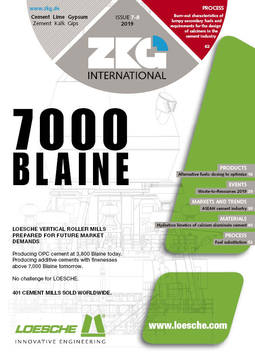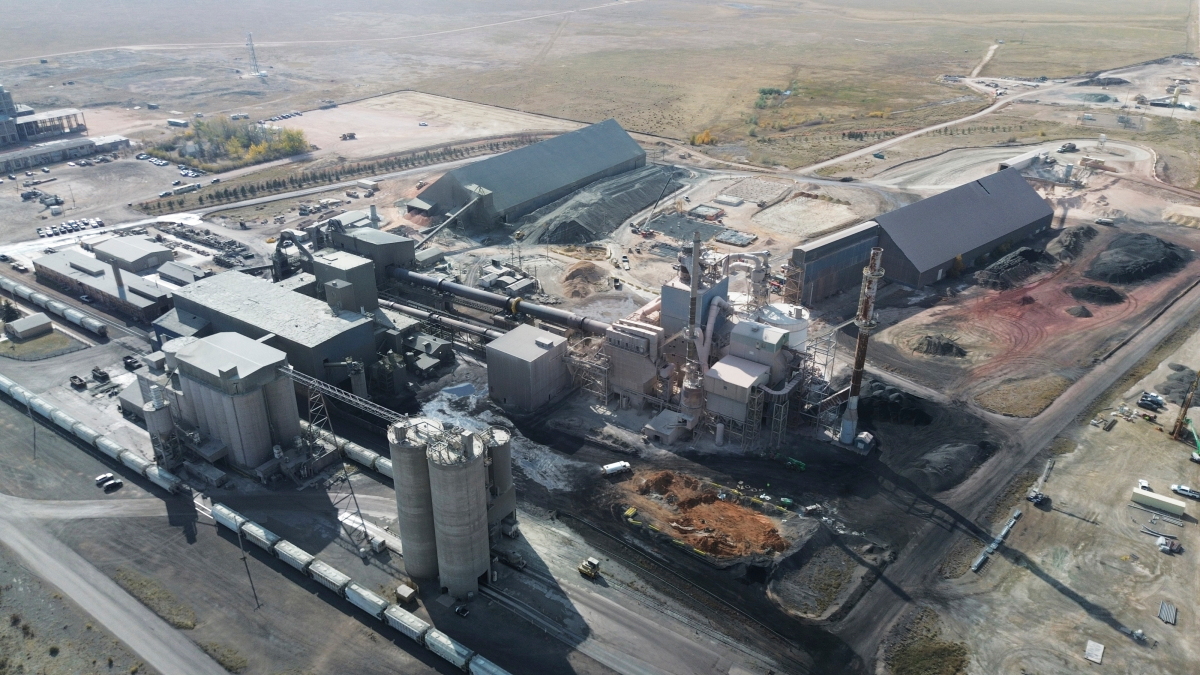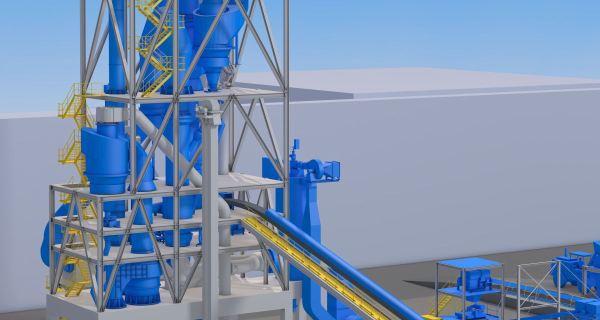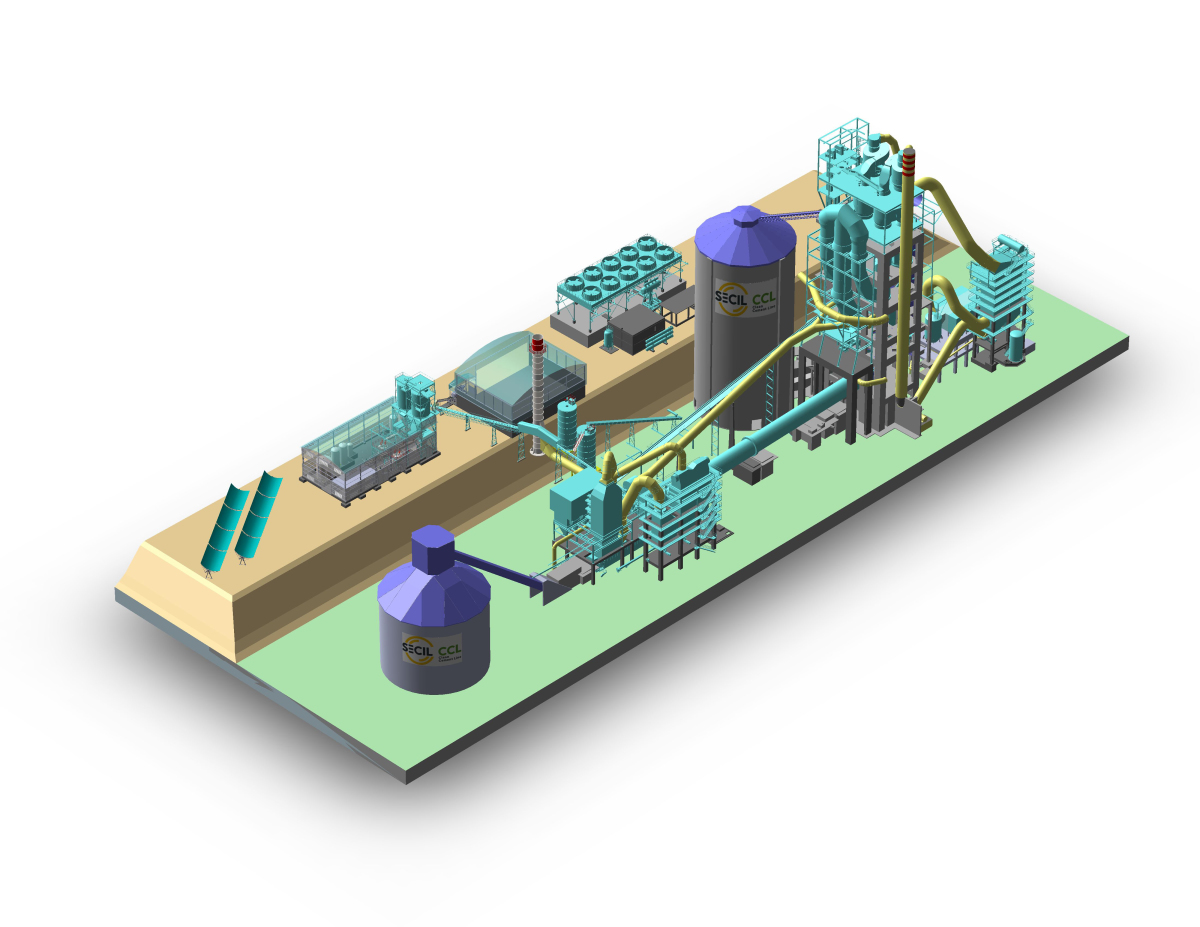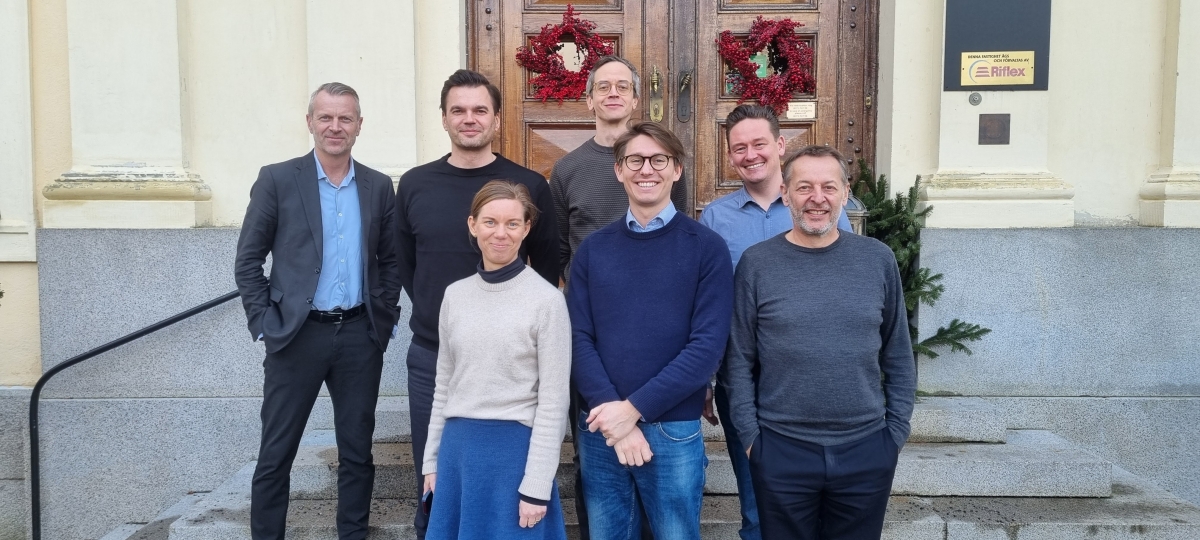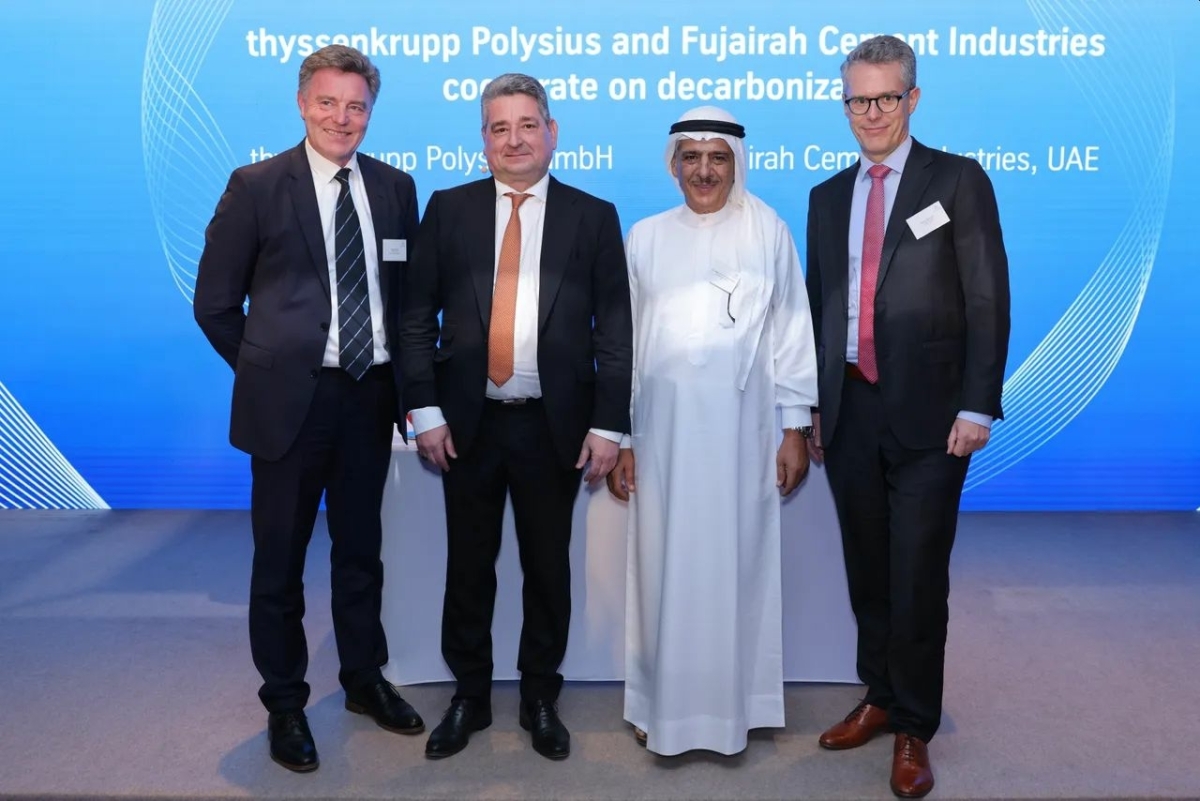polysius fuel substitution – improving the climate footprint of cement production
Fuels are an important cost factor for the cement industry. While fossil fuels are becoming increasingly scarce and expensive, many substitute fuels are widely available. For cement producers, the use of waste materials and biomass as fuel is a great opportunity – if they have access to the right techno-logy specific process engineering know-how. polysius® fuel substitution by thyssenkrupp Industrial Solutions AG is a one-stop solution for alternative fuel rates of up to 100 %.
Conserving resources, reducing emissions
The cement plant manufacturer thyssenkrupp offers a viable way to achieve greater sustainability in cement production: polysius fuel substitution makes cement plants more environmentally friendly by conserving natural resources and reducing fossil carbon dioxide (CO2) emissions. By replacing oil, coal and gas with alternative fuels e.g. waste and biomass, cement producers can significantly lower their operating costs. The comprehensive concept of polysius fuel substitution guarantees compliance with emission limits, constant process stability and product quality.
Building the polysius green cement plant
thyssenkrupp is a long-term technology partner of the cement industry and one of the few international full-line suppliers, taking on engineering, supply and installation of single machines, complex plant sections and turnkey cement plants. Its cutting-edge solutions for cement plant equipment are based on more than 160 years of engineering experience. thyssenkrupp’s product family brand for the cement industry is polysius.
Today, many stakeholders are demanding that the cement industry produces in a more environmentally conscious way. At the same time, plant operators must produce in an extremely economical manner. As an innovation driver in cement plant construction, thyssenkrupp is committed to meet both requirements at the same time.
thyssenkrupp is in the process of developing a fully green and digital cement plant for a more sustainable cement production. The vision of the polysius green cement plant is accompanied by the #grey2green initiative. Several components of #grey2green have already found their way into tangible products. Among other things, polysius fuel substitution is market-ready and available to cement producers worldwide. They can now take a big step towards a greener plant.
Less dependence on fossil fuels
polysius fuel substitution is a tailor-made solution for cement plants, enabling the use of biomass, industrial and municipal waste as a partial or sole source of heat in the cement process. To this end, thyssenkrupp has integrated proven components into a highly economical overall system. The plant manufacturer can upgrade cement plants with easy-to-implement and easy-to-operate add-ons that considerably reduce the cost of clinker production.
As the system is modular, the plant owner can choose between different solutions – depending on the available alternative fuel quality. With the start-up solution, thyssenkrupp offers technologies for a simple calciner feed; the intermediate solution achieves high substitute rates even with low-grade fuels; and the advanced solution allows maximum fuel substitution rates up to 100 %. Regardless of whether they opt for limited or comprehensive implementation, plant operators will become less dependent on fossil fuels.
thyssenkrupp can provide numerous references: The plant manufacturer has already equipped many cement plants on several continents for a high rate of substitute fuels.
Systematic approach to the waste-to-energy chain
polysius fuel substitution consists of various components that can be combined depending on the plant type, available fuels and customer requirements. The strategic focus is a low degree of treatment of alternative fuels – “burn what you get”. thyssenkrupp aims to offer the cement producer a technical solution that minimizes mechanical pre-processing efforts, leading to the most economical balance between operational costs and capital expenditure.
The plant manufacturer provides engineering, core products for incineration and emission control, additional technologies, factory automation applications and services to implement an individual customer-specific process. The plant owner can purchase the entire waste-to-energy chain from a single source – from storage, feeding, dosing and incineration to emission control. With special process know-how, thyssenkrupp can adapt the entire plant to the new conditions if fuel substitution is to be implemented.
Tried-and-tested technology
Although the system is more than the sum of its parts, all its individual components have an excellent track record: polysius fuel substitution is based on robust technologies used in cement plants around the world. Depending on the regionally available fuels, several key modules can be considered. In the field of the core components described below, thyssenkrupp is a technological pioneer.
polflame VN sintering zone and satellite burner
The polflame VN burner is equipped for highest rates of solid and liquid substitute fuels. If the burner is combined with satellite tubes for the additional injection of solid secondary fuels, it is even possible to completely dispense with fossil fuels at the kiln. A patented burner design allows precise adjustment of the oxygen supply and control of the combustion hot spots, leading to perfect ignition and burnout of different fuels at lowest NOx emissions. Satellite tubes can easily be retrofitted to any kiln hood; no modification to the burner is required.
prepol calciner
By retrofitting a new calciner or upgrading an existing model, it is possible to reach high substitute fuel rates and low emissions. The heat for preheating and calcination is provided directly in the prepol calciner by incinerating substitute fuels that are two dimensional (e.g. foils) and up to 100 mm in size. Due to a bilateral calciner inflow, tertiary air and kiln off gas are perfectly mixed. The operator can flexibly adjust oxygen and temperature in the flue gas denitrification zone (DeNOx) and achieve full burnout with lowest carbon monoxide (CO) and total organic carbon (TOC) emissions.
Calciner add-on: combustion chamber prepol SC-S or prepol SC
For the combustion of three-dimensional, very coarse and wet fuels at the calciner thyssenkrupp recommends prepol® SC-S or prepol® SC. These highly efficient step combustors considerably reduce mechanical pre-processing efforts. Following the “burn what you get” approach, prepol SC fully incinerates ultra-coarse, wet waste and biomass with a moisture content of up to 60% and particle dimensions of up to 300 mm. Long retention times of a maximum of 1000 seconds guarantee high burnout rates.
The shorter prepol SC-S reliably incinerates biomass and waste with particle dimensions of up to 150 mm. This easy-to-implement technology offers an effective way to increase the retention time of coarse substitute fuels – even if no calciner and no tertiary air is available.
The prepol SC/SC-S system is lowest maintenance and long-lasting, as there are no moving parts in the combustion zone. The separation of the fuel by a patented air blast transport guarantees a most thorough combustion: Fine particles are discharged in the calciner while coarse particles remain on the grate. Due to the modular, patented air blast transport the prepol SC/SC-S systems can be up- and downscaled to any alternative fuels capacity.
Chlorine bypass systems
When it comes to high substitution rates, kiln exhaust gas with high chlorine content can be extracted using the thyssenkrupp chlorine bypass system. The CFD-optimized design allows highest chlorine concentrations while ensuring lowest heat losses and a minimized amount of bypass dust for disposal.
The core products and systems of polysius fuel substitution will be combined with additional equipment: thyssenkrupp provides all components from fuel delivery to the thermal conversion and compliance with emission limits.
Made to measure
What are the first steps in implementing polysius fuel substitution in a plant? In order to determine the status quo and find an optimal overall solution, thyssenkrupp offers comprehensive consulting and plant audits. Specialized process engineers provide a report with a description of the recommended fuel substitution options.
Project parameters are determined by several factors. One of these is the plant type: long kiln, preheater and/or calciner. Fuel prices, payback times, technical feasibility and personal preferences of the customer are also decisive factors in planning.
With polysius fuel substitution, the plant operator can flexibly adjust the kiln process to various fuel types. In addition to the incineration of high-grade substitute fuels, thyssenkrupp’s system facilitates the use of low-grade substitute fuels e.g. municipal and commercial waste as well as biomass. In particular, substitute fuels with high moisture and organic content, large particles and low calorific value hold great potential for economic optimization.
Examples of substitute fuel types are whole tires, mono fractions (e.g. tire or wood chips and high, medium and low-quality refuse-derived fuels from commercial, industrial and municipal waste). Other substitute fuels include composite rotor blades, biomass, meat-and-bone meal and sewage sludge.
Positive effects of polysius fuel substitution
polysius fuel substitution is a key part of thyssenkrupp’s solutions to increase the sustainability of cement plants. The process has advantages for the environment and the cement industry. At the same time, it provides a service to society: thermal waste disposal. polysius fuel substitution significantly conserves natural resources and reduces land consumed by landfills. The thermal utilization of waste also avoids methane emissions that would result from landfill sites.
Incineration is a well-established waste treatment process. In many cases, the heat is used to generate electricity. polysius fuel substitution is even more productive: Its overall thermal efficiency is higher because the heat is used directly in the process without being converted into electricity.
A big plus: The solution reduces fossil CO2 emissions attributed to cement production, since the biomass fraction is considered carbon-neutral. With prices for certificates on the rise, reducing fossil carbon emissions is an important advantage for cement producers in many countries. In addition, thyssenkrupp’s process technology achieves a significant decrease in nitrogen oxide (NOx) emissions.
Those who aquire the technical prerequisites for the combustion of substitute fuels increase the versatility and efficiency of their plant. Compared to conventional fossil fuels, substitute fuels tend to be cheaper, and the price difference could become even greater in the future. Cement operations can achieve significant OPEX savings, so the investment in the fuel changeover will pay for itself quickly.
thyssenkrupp’s individually scalable polysius fuel substitution gives cement producers the option to replace a smaller proportion of fossil fuels or aim for a significantly higher fuel substitution rate. In any case, they benefit from more flexibility in fuel choice, a better environmental footprint and more efficient processes.
//www.greencementplant.com" target="_blank" >www.greencementplant.com:www.greencementplant.com

